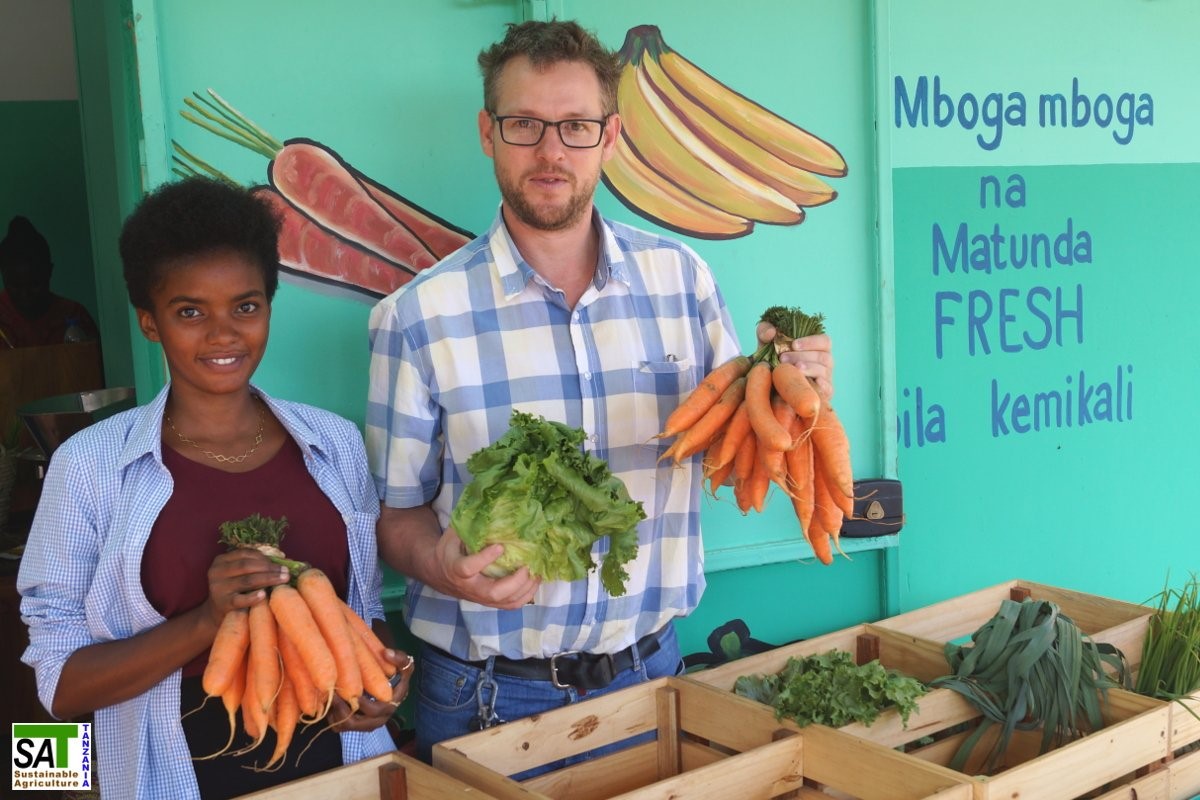6th highest number of certified organic farmers - Tanzania’s organically grown success

date: 16/01/2018
It may come as a surprise to hear that Tanzania has the sixth highest number of certified organic farmers in the world (and the third highest in Africa). The strength of the organic agriculture sector in Tanzania comes partly from the systems and institutions in place which make the farming system so accessible. These include the East African Organic Products Standards (EAOPS) and the Participatory Guarantee System (PGS). Moreover, there is a network of organic farmers, civil society organisations and businesses that drive the sector from within. Tanzania’s vast regions of fertile and productive land are of course another contributing factor.
Certified production to International Organic Standards
The major crops for organic certified production in Tanzania are coffee, cotton, cocoa and tea. These cash crops are often produced by cooperatives of farmers, who work with third party certification bodies to certify their produce to international standards, before bulking their harvests and forging trade routes abroad. One such cooperative currently making ground in Tanzania’s organic sector is the Kagera Cooperative Union (KCU). KCU initially got involved with organic producers because of their concerns for environmentally friendly farming as well as the quality requirements of their buyers. For KCU, organic production has proven to be a valuable niche. The organic premium price for coffee is about 1 USD/kg more than the conventional price and the cooperative has seen demand for organic coffee soar recently. In the last two years alone they estimate that demand has doubled for organic coffee with most of it going to Europe.
Located in the North-West of Tanzania, along the border with Rwanda, Burundi and Uganda, Kagera’s lush, green and hilly landscape is home to banana and coffee growers.
Another key player in the organic agriculture sector in Tanzania is Biolands. The trading company works with smallholder cocoa farmers, training them to scale up quantity and quality of production and meet the organic certification requirements. Biolands then buys the organic cocoa and exports it abroad, with most demand coming from the USA, Belgium and Spain. The company has recently received worldwide publicity and they credit their organic production system for keeping them competitive. Like KCU, Biolands have observed the growing trend of consumer interest in organic products, with new buyers now emerging. For Biolands, the main reasons for growing organic are that the production system is environmentally friendly, fetches a higher price and greater demand, and has positive health benefits for consumers. Organic farming also helps Biolands to fulfill their ‘Forever Chocolate’ strategy of making 100% of chocolate ingredients sustainable by 2025.
Small-scale farmers certify their organic produce to local standards
The Tanzanian organic sector is not only made up of large cooperatives and producer groups. More and more small-scale farmer groups are emerging and certifying their production systems. This is made possible by the unique relationship between two institutions: the East African Organic Products Standards (EAOPS) and the Participatory Guarantee System (PGS). The standards take into account the specific requirements and intricate conditions on Tanzanian smallholder farms. Certification of a farm to the EAOPS enables the farmer to label his produce with the Kilimohai Mark (pictured). To make the certification process more accessible, groups of farmers may apply for certification together through PGS, a low-cost quality management system. As defined by the International Federation of Organic Agriculture Movements (IFOAM), PGS systems “are locally focused quality assurance systems. They certify producers based on active participation of stakeholders and are built on a foundation of trust, social networks and knowledge exchange." In Tanzania, PGS certification is overseen by the Tanzania Organic Agriculture Movement, a member-based umbrella organisation; connected to other national organic agriculture movements around the world through IFOAM.
The Kilimohai mark is used in East Africa to distinguish organic certified products from conventional foods.
Currently Tanzania has 14 groups certified by the EAOPS through PGS and 27 more groups in the process of certification. The average group size is 30 smallholder farmers. 12 of these groups work with Sustainable Agriculture Tanzania (SAT), a non-profit organisation based in Morogoro, central Tanzania. SAT provides organic agriculture training to their farmers and distributes their products through an outlet in Morogoro, selling to buyers in Kilimanjaro and Dar es Salaam and providing home and office delivery services. SAT has also seen the fruits of the organic sector first hand. The premium price for organic produce sold by SAT varies between 20 and 50% above the conventional price for fruits and vegetables. For instance, whereas a conventional farmer would expect to get 1000 Tanzanian Shillings (0.45USD) for a bundle of carrots, SAT pays their organic farmers 1,500 Shillings (0.7USD). According to SAT, the customer base is only growing. “This is partly due to the increased health awareness on the importance of organic products among the customers,” says SAT’s Marketing Officer Akley Mbaye.
Through NGOs like SAT in Morogoro and others across Tanzania, farmers see real improvements in income and quality of life through organic agriculture.
Organic farming is on the rise in Tanzania, offering an opportunity to enterprising individuals, groups and investors to contribute to the nation’s green economy by sustainably producing safe food. With continued coordination from TOAM, as well as contributions from the sector’s many stakeholders, it has the potential to significantly contribute to the nation’s economic development and the health of the people and environment.
By Environment & Climate Change Mainstreaming facility
-----
* According to the United States Environmental Protection Agency (EPA).
